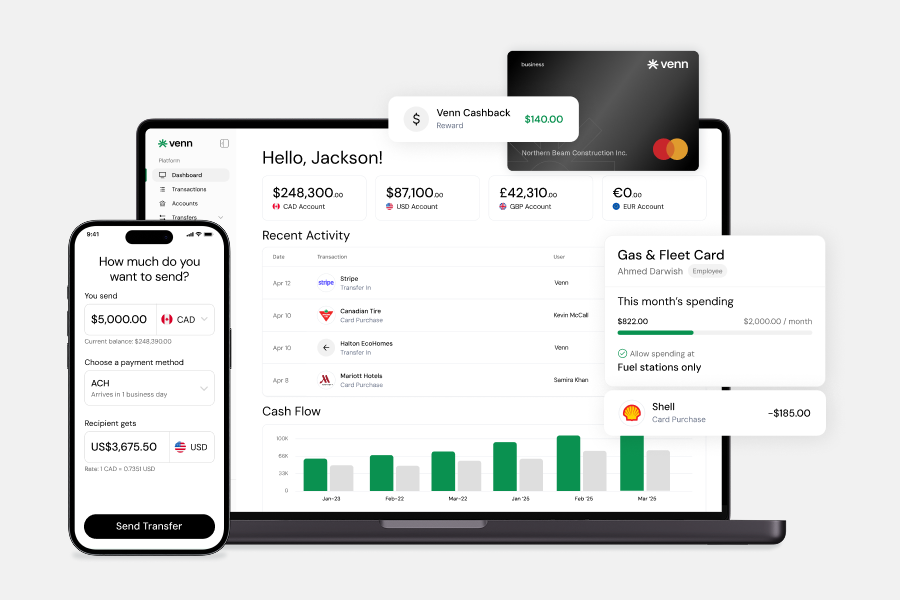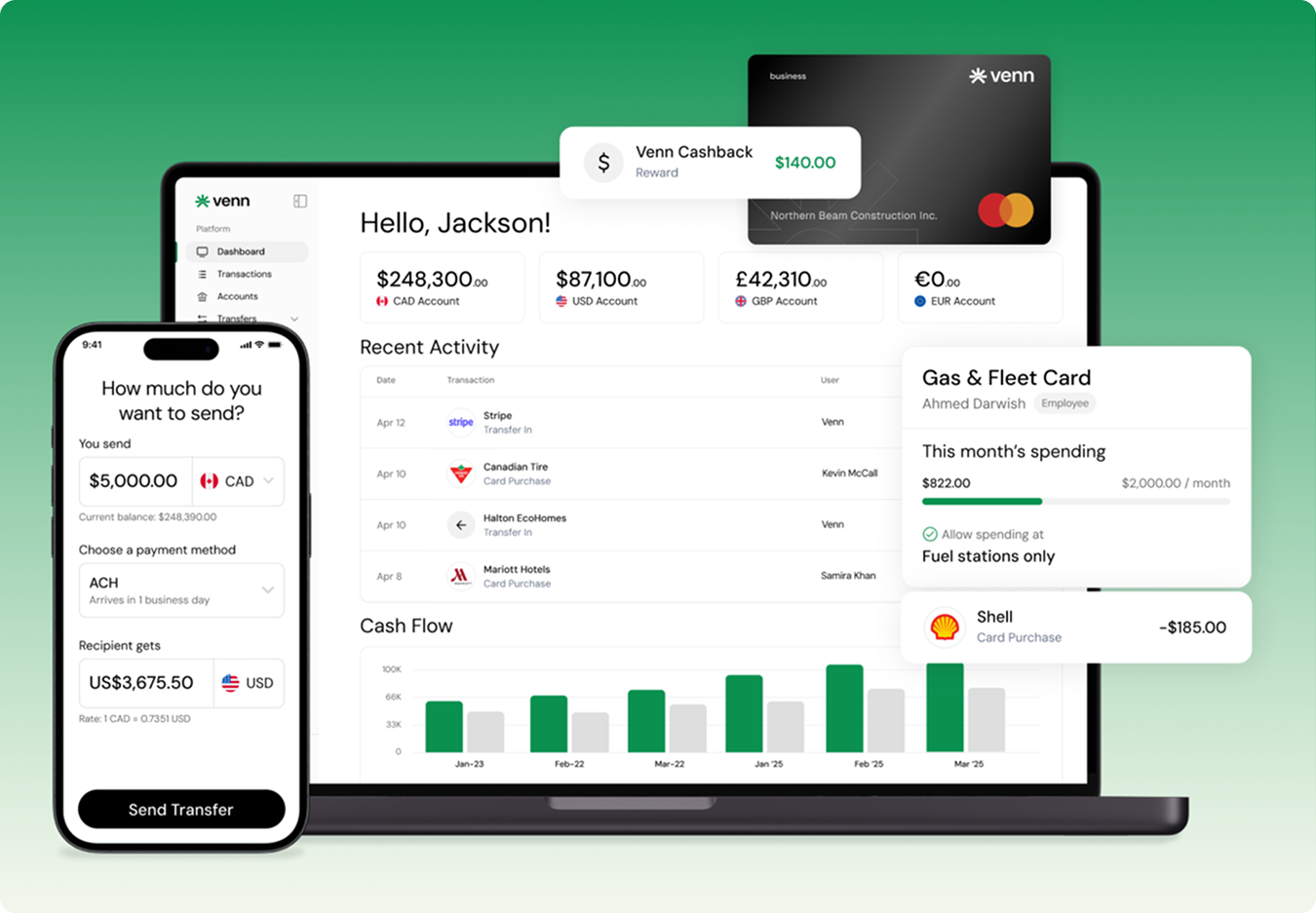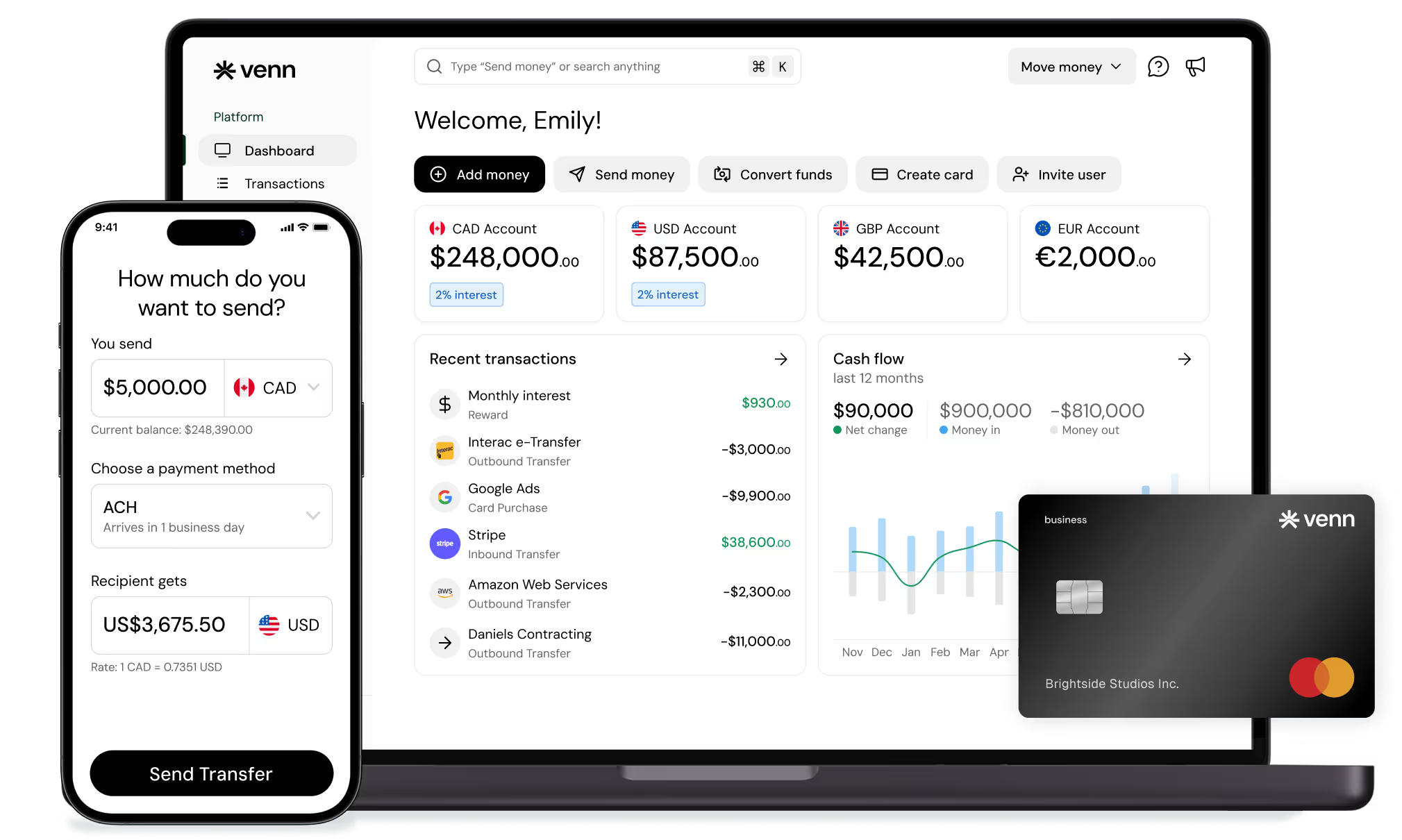What to Expect After Incorporating in Canada
Once your business is incorporated, the real work starts. From annual filings to keeping your books clean, here’s what Canadian founders need to stay on track.


Trusted by 5,000+ Canadian businesses
Business banking for Canada
Local CAD and USD accounts, corporate cards with cashback, the lowest FX rates in Canada, free local transfers, and more.
Most founders think incorporation is the finish line. In reality, when you register a business in Ontario or complete a Canada company registration, you officially move from idea to legal entity. Incorporating your business brings credibility and protection, but it also introduces new responsibilities. There are filings to make, accounts to open, and systems to organize.
This guide walks you through exactly what to expect after incorporation so you can stay compliant and start strong.
Step 1. File your Initial Return (Ontario only)
If you choose Ontario business incorporation, you need to file an Initial Return within 60 days. This filing confirms your corporation’s directors, officers, and registered office address. Missing it can put your business out of good standing.
You can complete this filing directly through the Ontario Business Registry. Federal corporations do not file this return, but they do have ongoing requirements with Corporations Canada.
Step 2. Open a business banking account
After incorporation, the first financial task is to separate your company’s money from your personal money. A dedicated business banking account preserves your limited liability and keeps your records clean.
When you incorporate with Venn, your CAD and USD accounts are included in the same flow. Once your incorporation is approved, your accounts are ready to use on day one. You can accept payments, pay vendors, and issue corporate cards without visiting a branch.
If you are opening an account elsewhere, bring your Articles of Incorporation and government-issued ID. The account must be opened in the corporation’s full legal name.
Step 3. Set up an account with the correct business registry
Think of this as keeping your incorporation registration in Ontario or federally up to date. Your incorporation has to stay active with the right registry:
- Federal corporations: Register with Corporations Canada.
- Ontario corporations: Register with the Ontario Business Registry.
This is where you file annual returns, update directors, and change addresses. Set up alerts so you don't miss deadlines.
Step 4. Keep your corporate records up to date
Your corporation is required to maintain certain internal documents that show it is being managed properly. These records are often reviewed by accountants, lawyers, investors, and regulators.
- By-laws: The internal rules that explain how the company operates, how meetings are run, and how directors are elected.
- Minute book: A central record of all official corporate documents, including your Articles of Incorporation, share registers, director registers, meeting minutes, and resolutions.
- Resolutions: Written records of key decisions, such as appointing officers or issuing shares.
Update these records whenever there is a change in ownership or directors, and file those changes with the registry. Keeping clean records protects you as a director and builds trust with stakeholders.
Step 5. File your annual returns
Every corporation must file an annual return with its registry. This is separate from your tax return.
- Federal incorporations file through Corporations Canada.
- Ontario incorporations file through the Ontario Business Registry.
Many founders are surprised that filing does not stop after setup. Annual returns are required every year, without exception.
Step 6. Register a business name if needed
If you are incorporated under a numbered company (such as 12345678 Canada Inc.), you can register a business name to operate under something more customer-friendly.
You can do this through the same registry where you incorporated.
For example, if you opened a company in Canada as a numbered corporation, you might still want a brand name for marketing purposes. Registering that name ensures you can legally use it with customers.
Can two businesses have the same name in Canada? Check here.
Step 7. Set up CRA accounts
After you start a corporation in Canada, you may need to register with the Canada Revenue Agency (CRA).
Register with the Canada Revenue Agency for:
- A GST/HST account if your business earns over $30,000 annually.
- A Payroll account if you hire employees.
- Import/export accounts for international trade.
Even if you do not meet the thresholds right away, registering early helps you avoid last-minute compliance issues and lets you claim input tax credits.
Here’s how to register for a GST/HST number in Canada.
Step 8. Organize compliance and record-keeping
Beyond the documents themselves, someone in your business needs to take ownership of compliance.
- In small corporations, this is usually the founder or a director.
- As you grow, the role is often handed off to a finance lead, office manager, or bookkeeper.
- In larger companies, a controller or CFO oversees compliance with support from advisors.
Their job is to make sure filings are submitted on time, corporate records are updated, and annual returns are never missed.
Venn makes this easier at every stage. Our platform helps you stay organized with built-in invoicing, expense tracking, and accounts payable tools in one platform, synced with your accounting software. Fewer manual steps and less risk of missing something important.
Step 9. Understand provincial obligations for federal corporations
If you incorporate in Canada at the federal level, you also need to register in the provinces where you do business. At minimum, this means the province where your registered office is located.
For instance, a federal corporation with an office in Ontario must still complete Ontario business incorporation registration. If you expand into Alberta or British Columbia, additional provincial registrations will be needed.
When you incorporate federally with Venn, we take care of registering your home province for you.
Step 10. Put financial systems in place early
Opening an account is just the beginning. As your business grows, you need systems that reduce manual work and help your team stay in control.
With Venn, you can:
- Issue corporate cards with spending controls
- Automate payroll and vendor payments
- Connect to accounting platforms like QuickBooks and Xero
- Handle international payments with low FX fees
Putting these systems in place early means your finances stay organized as you scale, without relying on manual processes or juggling multiple tools.
The final step after incorporation is building systems that keep your finances organized. With Venn, Canadian businesses get CAD and USD accounts, corporate cards, low FX fees, and automated payables and invoicing.
Stay compliant, keep finances clean, and move money smarter from day one. Try Venn today!

Frequently Asked Questions (FAQ)
Q: How do I incorporate with Venn?
The process to incorporate with Venn is streamlined and links your legal setup directly with your financial setup. You can choose to incorporate federally (available for Ontario businesses) for $199 or provincially in Ontario for $299. This fee includes the government filing cost, all necessary legal documentation (digital minute book), and the immediate opening of your new business CAD and USD bank accounts. Additionally, you may be eligible for a bonus of up to $350 when you fund your new account.
Q: Do I need to display my corporation number on invoices or contracts?
Yes. Canadian corporate law requires you to display the corporation’s full legal name—which includes the legal designation (Inc., Ltd., or Corp.) and the numbered company if you did not register a trade name—on all official documents. This includes contracts, invoices, purchase orders, cheques, and other negotiable instruments. Failure to clearly display the full corporate name may result in the directors or officers being held personally liable for the corporation's debts or obligations.
Q: Do shareholders need to pay for their shares right after incorporation?
Yes. Under the Canada Business Corporations Act, shares cannot be legally issued until the consideration (payment) for those shares is fully paid to the corporation. This payment is typically the agreed-upon subscription price, which is usually deposited into the corporation’s business banking account upon the initial setup. Proper documentation of this payment must be created and maintained in the corporation’s minute book.
Q: What happens if I miss my annual return filing deadline?
If you miss the annual return filing deadline (which is separate from the CRA corporate tax return, or T2), your corporation will be marked as "overdue" or "not in good standing" on the government registry. If the filing failure persists for two consecutive years, the corporate registry may proceed with administrative dissolution, meaning the corporation loses its legal existence, cannot legally conduct business, and may require a costly and time-consuming revival process to restore its status.
This publication is provided for general information purposes and does not constitute legal, tax or other professional advice from Venn Software Inc. or its subsidiaries and affiliates, and it is not intended as a substitute for obtaining advice from a financial advisor or any other professional. We make no representations, warranties, or guarantees, whether expressed or implied, that the content in this publication is accurate, complete, or up to date.
Venn is all-in-one business banking built for Canada
From free local CAD/USD accounts and team cards to the cheapest FX and global payments—Venn gives Canadian businesses everything they need to move money smarter. Join 5,000+ businesses today.

Frequently asked questions
Everything you need to know about the product and billing.
Venn is the cheapest and easiest way to manage your business banking needs. We offer the best currency exchange rates in Canada, chequing accounts in multiple currencies, domestic and international bank transfers, and a corporate Mastercard to manage all your spend. By signing up to Venn you automatically get:
- Accounts in Canadian dollars, US dollars, British pounds, and Euros
- The cheapest FX rates in Canada with free domestic transfers (EFT, ACH, SEPA, FPS)
- A Mastercard Corporate card that gets you the same great FX rates and cashback with no minimum spend requirements
Yes, Venn holds eligible deposits at our Partner Institution in our trust accounts, including deposits in foreign currencies. CDIC protects eligible deposits up to CA$100,000 per deposit category per CDIC member institution.
No, we don’t have any hidden fees! All charges, including currency conversion and premium plans, are clear and transparent. You can even issue unlimited corporate cards to your team and sign up with a free plan in minutes! Learn more about our transparent Pricing.
Nope! Other companies and traditional bank accounts have high minimum balance requirements. This makes accounts inaccessible for small businesses or individuals. Venn does not require a minimum balance. Your CAD and USD funds will also earn 2% interest regardless of the balance.
Our process is quick — Customers typically get set up in 5 minutes or less! Create a free account and start saving with no monthly fees, cashback on card spend, and the best FX rates around.
Of course! Our friendly Support specialists are available via Chat or Email 24 hours a day, 7 days a week, 365 days a year. All tickets are monitored and responded to within 24 hours, with an average response time of 30 minutes.
Yes, we have a direct integration with QBO and Xero. We are working on more integrations very soon!
Join 5,000+ businesses banking with Venn today
Streamline your business banking and save on your spend and transfers today
No personal credit check or guarantee.


